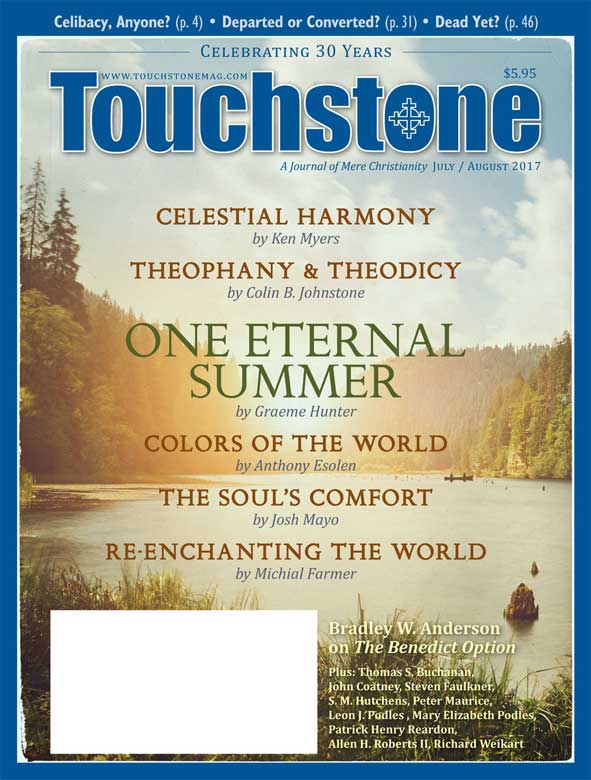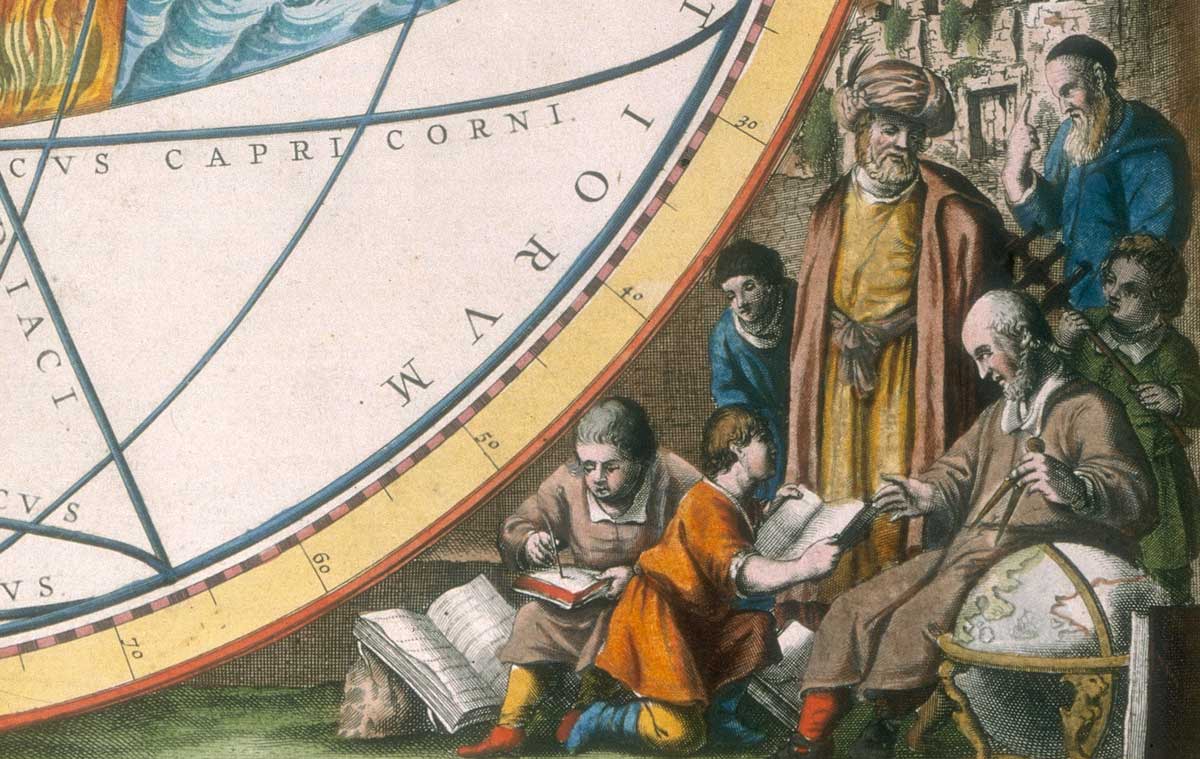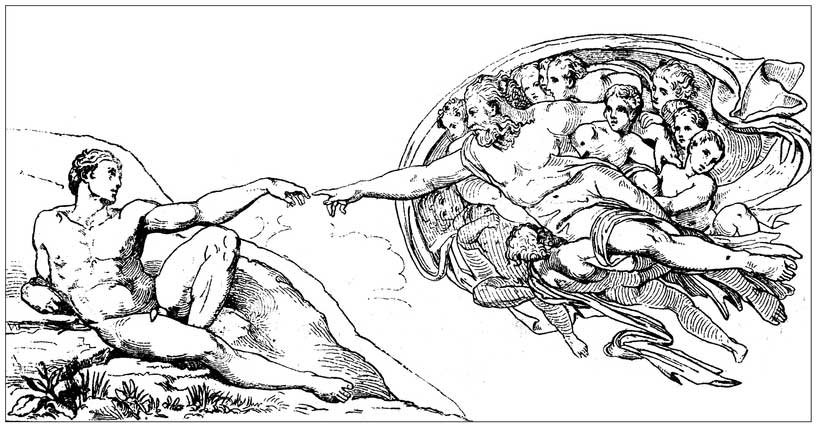Feature
Theophany & Theodicy
When the Inevitable Questions of Suffering Confront the Living God
Going through my father's papers, my mother came across an unpublished article that my father wrote a few years before the onset of Alzheimer's. The progress of the disease made the revising and editing of this article challenging for him. My father had studied the Western classics, and became a theologian and then an applied theologian, spending 25 years in a cancer research hospital as a chaplain. He provided care for terminal patients, taught aspiring chaplains, and counseled scientists and medical doctors in the ethics of care and research. My father wrote the original article that follows; I have abridged and edited it for publication. —David M. Johnstone
There are many important theological questions that are worth struggling with, but the questions that stir our theological passion and return to stir us to further examination are usually questions that arise from our own personal story. An exciting or distressing theological question is usually one that comes out of our pain or our joy. It often is so important to our existential wellbeing that we cannot let it alone.
Questions of theodicy, questions concerning the reconciliation of belief in God's goodness with the existence of evil and suffering, are among the passionate existential questions. They come out of my own story. "Why me?" is not a textbook question but rather a question that comes out of my life and stirs my passions every time it returns. I believe that the important existential questions do return repeatedly, for they are questions of the heart, not of the head. We may have excellent answers for the questions, but they do not quiet the heart's ache. The heart cries, laments, and complains, and although it expresses itself in the language of a question, an answer will not satisfy the lament of a heart.
The Epic of Job
One who honestly and courageously faced the theodicy questions of his story was the man of Uz named Job. I like Job. I know that he is sometimes portrayed as a self-centered male who was more concerned about his own pain than the pain experienced by his wife, the mother of their children. However, that self-centeredness is often typical in the life of one who is overwhelmed by theodicy questions. At least Job confronted his own suffering and cried out his defiance and his pain. Job was not quiet, nor was he patient. He trusted God, and God trusted Job.
I want to examine the mysterious way in which an encounter with the Holy can "answer" the question of God's role in human suffering. In the book of Job there is a paradigmatic theophany in which the voice of God silences the questions and complaints of Job. In Christianity, the experience of the Crucified and Risen Christ, the One who suffers with us, seems to "make it okay" to live without a clear answer to theodicy questions. In pastoral care, we seek to be able to "be with another," and to accept the emotions, the emotional outbursts, the spiritual despair, and the theological questioning. This essential dynamic is not only rooted in good psychological and counseling technique but is also grounded in our experience and understanding of the nature of God and God's response to human suffering.
We know relatively little about Job as a historical figure. He was possibly an Edomite from the second millennium b.c. whose life or story was translated and edited into the canonical book sometime in the postexilic period. Job is an epic tale that is most certainly rooted in truth. Job is described as "blameless and upright, one who feared God—the Lord—and shunned evil" (Job 1:1), a man whose lifestyle could legitimately be described as innocent and underserving of the calamities that come upon him.
While the narrator is introducing us to Job and his thoughtful, caring innocence, we are privy to a conversation between the Lord and Satan, the Accuser, during a gathering with the other divine courtiers ("the gods"). We hear Satan reporting on his observations from "roaming the earth and strolling about in it" (1:7). The Lord, speaking like a proud mentor, asks Satan if he has noticed Job, "a blameless and upright man who fears the Lord and shuns evil" (1:8). Satan, acting like the devil's advocate that he is, challenges the Lord's perception, claiming that Job's righteousness is of a self-serving nature. The Lord appears to fall into Satan's trap and takes the challenge: "Here, all he has is in your power, but do not lay a hand on him" (1:12). This is expanded at a second encounter to, "Here, he is in your power; only spare his life" (2:6).
Wager, Hope & Trust
In a classical tale of parallel lives crossing only in tragedy, we see Job becoming the innocent victim of a cosmic "wager" between the Lord and Satan. There is no doubt in the mind of the reader that Job is, indeed, blameless and upright. He is perceived to be such by the narrator, by his fellows, and by God himself. Satan is the only one to challenge this description, and that is his role in the divine court. Job is innocent and doesn't deserve anything that happens to him. What happens to him is the result of what is happening elsewhere. It is not hard to be reminded by this story that most suffering is the result of what happens elsewhere.
It is also to be noted that this story is one of mutual trust between God and man. The Lord and Job are both "willing to stake their reputations" on the faithfulness of the other. The tale goes on to tell of the death of Job's sons and daughters, the loss of his wealth, the anger and rejection of his wife, his physical agony, and his emotional and spiritual despair. Job withdraws to a dung heap to mourn for a week, but then his friends try to convince him of his guilt. He does not argue against or reject their simplistic theology predicated on the assumption that God is just and that everyone gets what he deserves. Job does not argue against that; he simply states that he is not getting what he deserves. There is a mistake somewhere, and if he could only speak to God he would be able to clear it all up.
Job's one hope is to confront the Lord. He could then explain his situation to him, and the Lord would set things right. Job is looking for a resolution to his suffering rather than a solution to the theodicy question. Some scholars suppose that the purpose of Job was to solve the mystery of suffering; others note that, if so, it failed in that purpose. Theodicy, which attempts to explain and justify the Lord's role in the suffering and evil in the world, is part of trying to understand the prevalence of suffering and evil.
Many writers have used the book of Job as the starting point in their search for a way to make sense of the dilemma of theodicy. Some note the alternating fairness, silence, and seeming absence of the Lord. Others note that the book of Job seems to suggest that God cannot do everything because he is limited in his power.
Scholars agree that Job was an "innocent sufferer," or that he did not deserve the suffering that he experienced. Most also agree that the "comforters" were wrong in their automatic judgment that suffering is the result of the sufferer's sin. Some writers tend to use the book of Job as a starting point, assuming that the theodicy question is the most important one, and so if the book of Job does not come up with a good answer, they will. Rarely is the question itself questioned.
Inadequate Answers
Stanley Hauerwas, in Naming the Silences, does question the question. He notes that the traditional answers to the theodicy question are inadequate. They do not really pay attention to "why that question seems so important to us who inhabit the world we call modern and why illness seems so often to occasion such questions." He explores stories of innocent sufferers, like children dying of cancer, and shows how our post-Enlightenment society believes that we can eliminate their suffering by curing them, solving the "problem" of suffering by eliminating its causes. We believe that if we can discover what causes pain, illness, and death, we will be able to abolish suffering. There is no room in the post-Enlightenment, scientific worldview for suffering as an integral part of human life.
Hauerwas rejects this post-Enlightenment resolution of human suffering, but he also critiques classical formulations that seem to imply that if one could understand why he suffers, his suffering would disappear. We would not have to question God's sovereignty or providence if we could understand God's reasons.
In Cancer and the God of Love, Melvyn Thompson suggests that understanding God's reasons would not heal suffering because suffering finds its locus at a level deeper than the rational. Similarly, any attempt to resolve suffering by prevention, or at the symptomatic level only, ignores the human reality that the physical component is real but only part of the experience of suffering. It seems to me that much of the problem of the "usefulness" of the theodicy question and its classical answers revolves around the issue of who is asking the question. Most of these answers are offered in the second person (You are suffering because . . .) by someone deeply disturbed by the suffering of someone else. It is usually offered in an attempt to change the person's mind about his or her suffering, and it assumes that suffering is a human problem.
Good Question
The situation is quite different when it is the sufferer himself who is asking the question. When a sufferer asks, "Why me?" he is addressing God directly and assuming that suffering is a human/divine problem. In fact, it is often a private conversation between God and the sufferer.
I would not wish this reflection to be construed as an attempt to deny the value of struggling with the theodicy question. Caregivers, especially pastoral caregivers, need to "justify" the behavior of the One in whose name they come, but they should not confuse an adequate working theology of suffering with a pastoral methodology for easing suffering. Their care should not be used to stop the questioning; it should be used to help people who have stopped questioning to restate questions that remain unresolved.
Several years ago, I suggested that the question "Why me?" asked by a sufferer ought to be listened to and the emotions responded to, but the question itself not answered. I argued that until the emotions were heard, the question couldn't be dealt with. I wrote of venting the emotions, differentiating the question and integrating it into a search for meaning. I stated that, very often, when the emotions are listened to, the question seems to lose its power and to no longer need an answer. Since then, I have become aware of Walter Brueggemann's works. He describes the lament psalms as "Israel's foremost word on pain and Israel's most daring theological act." He goes on to say, "Israel articulates its pain publicly not simply as a cathartic activity, but in order to make the pain into public business of God."
I can see now that what I was encouraging pastors and chaplains to do was to encourage a psalm of lament, not just for catharsis but to make it God's business. I believe that Job was questioning and lamenting, not asking for an answer to the theodicy question. He was complaining so that God would "go public," and like Israel, he could complain because the covenant made the relationship mutual. The Lord does come to Job and speaks to him from the whirlwind, and that encounter transforms Job. His perception of reality is affirmed, his trust in God is vindicated, and his life and suffering are radically transformed.
Personal Divine Answer
But the answers given by the Lord are not neat and universally applicable; they are messy and somewhat uncomfortable. Is this the end of all theological and rational efforts to come to terms with suffering and injustice? The author of Job seems to suggest that only a personal encounter with God can bring the sufferer to the point of accepting his suffering in silence and resignation. Theological talk about suffering is a little hollow. It is true that God's own discourse is theological. But Job's capitulation is due, not to the argument presented to him, but to the encounter with God itself. Only the experience of the living God who enters into dialogue with him, or instructs him personally, can convince Job.
It is the encounter with the living God that heals and transforms. When we explore the dynamics of Job's healing, we see clearly that the very presence of God is sufficient. In this encounter, however, we must not ignore the content of the discourses, for that is also important. The Lord not only spoke out of the whirlwind, but also directed Job's attention to the whole of creation. A sufferer is like an astronomical black hole that draws everything into itself. The Lord directs Job to look beyond himself to the total perspective of creation. It is as if he is saying, "Look around you, Job, and ponder the mysteries of creation. There are many things out there that you don't understand but can still appreciate." This calling out was a call to an encounter with the living God. Thus, theophany is experienced with fear and trembling, but there is also healing and resolution in the encounter. Job doesn't have anything more to say, because God has come.
A patient once told me that he went to heaven in a vision and entered the gates and was shown the Great Book with all the answers. When, in my curiosity and ignorance, I asked if he could remember any of the answers, he looked as if I should know better and said quite simply, "When you know that the answers are there, you don't need the answers anymore." I believe that Job experienced something like that and no longer needed answers because the Answer had revealed himself. The experience of God's self-revelation was so powerful that Job could do little more than silence himself and worship. Job is not the only sufferer who encountered God while lamenting and then ceased to lament because God was present.
It has been my experience that my personal pain and suffering has been resolved by the caring presence of another person or the caring presence of God. It has also been my professional experience that suffering is eased and resolved by a Healing Presence and not by a brilliant answer to the theodicy question. One who has explored theodicy and has come to an acceptable answer will probably be more able to minister to the suffering, but he will also find that it is not the answer itself that helps but the calm, trusting presence of the caregiver.
God's Revelation
A middle-aged Jewish cancer patient once asked me, "How can I get a miracle like people get on television?" As we explored that question and its meaning for her, she began to lament the recurrence of her cancer and to question whether God had favorites. Finally, she blurted out, "How can any person face the fact that she is going to die?" We explored many possibilities, but nothing satisfied her until I hesitantly said, "It is almost offensive for a Christian pastor to speak to a Jewish patient about the Holocaust, but I will. A Jewish psychiatrist named Victor Frankl, while in Buchenwald, said something like, 'The last freedom of the human soul is the freedom to choose one's response to the circumstances of life.'"
Days later, she told me that that story had made her feel that she was a part of the whole history of Israel and that her suffering was joined to her people's suffering. Her suffering had meaning, and she could face it with courage. God's self-revelations to her people and her own experiences of his presence were suddenly integrated into her life, and she could be supported by the experience.
For followers of Jesus, or even for those peripherally influenced by Christianity, there can be, in the midst of suffering, an experience of the presence of the Crucified One that is mysteriously comforting. Patients who are afraid of dying are comforted by the story of Jesus in the garden, anxious to the point of sweating blood, pleading with God and "bargaining." Those who are afraid of being abandoned and of dying alone are strangely comforted by the cry of desolation. The mystery of the Incarnation, "God with skin on," is nowhere more real than in the death of Jesus Christ. The scandal of the dying God gives meaning to the scandal of the dying child. There seems to be a balancing of the universe when a sobbing father, helpless at the painful death of his beloved child, remembers that the Lord, the creator of the universe and the source of all life, has also been a grieving father.
subscription options
Order
Print/Online Subscription

Get six issues (one year) of Touchstone PLUS full online access including pdf downloads for only $39.95. That's only $3.34 per month!
Order
Online Only
Subscription

Get a one-year full-access subscription to the Touchstone online archives for only $19.95. That's only $1.66 per month!
bulk subscriptions
Order Touchstone subscriptions in bulk and save $10 per sub! Each subscription includes 6 issues of Touchstone plus full online access to touchstonemag.com—including archives, videos, and pdf downloads of recent issues for only $29.95 each! Great for churches or study groups.
Transactions will be processed on a secure server.
more on philosophy from the online archives
more from the online archives
calling all readers
Please Donate
"There are magazines worth reading but few worth saving . . . Touchstone is just such a magazine."
—Alice von Hildebrand
"Here we do not concede one square millimeter of territory to falsehood, folly, contemporary sentimentality, or fashion. We speak the truth, and let God be our judge. . . . Touchstone is the one committedly Christian conservative journal."
—Anthony Esolen, Touchstone senior editor













